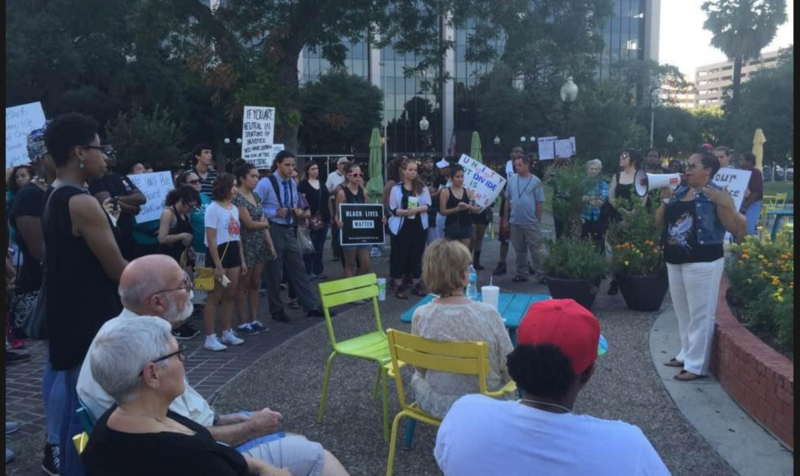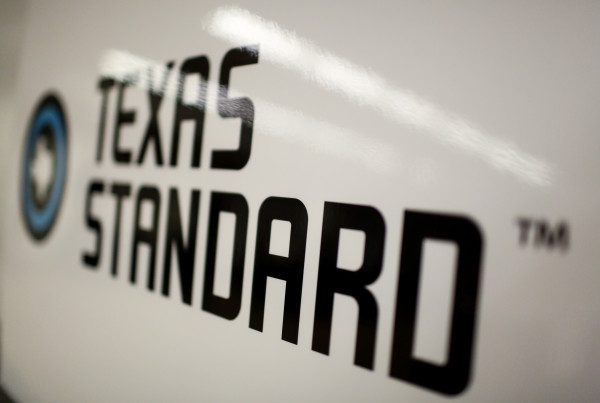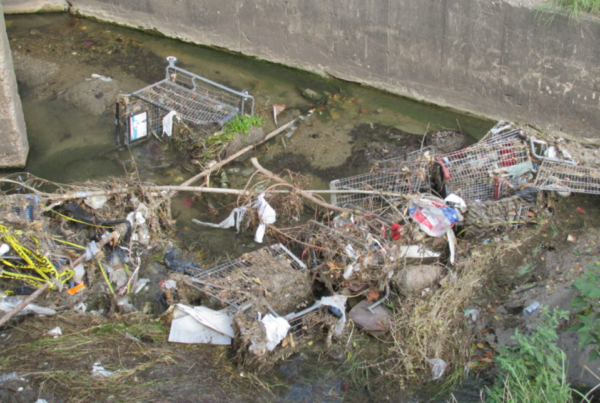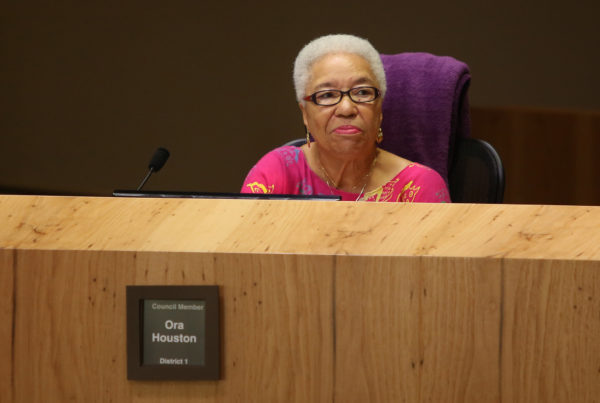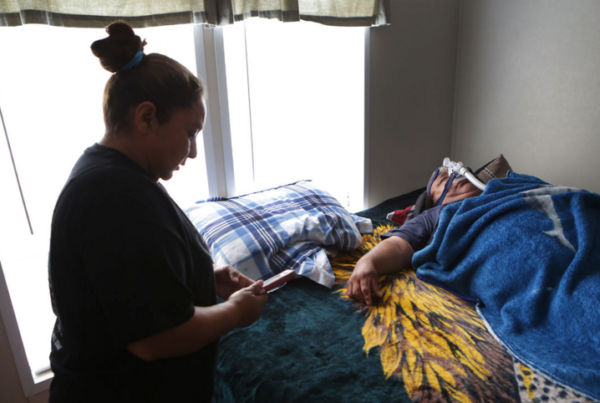From Texas Public Radio:
At a recent rally in Travis Park, a small crowd of protestors hold signs that say things like ‘Cops Are Not Above the Law’ and ‘Your Silence Is Deafening.’ Activist Mike Lowe points out that they’re standing around a monument to dead Confederate soldiers.
“All over America, we have reminders of white supremacy. I’m a firm believer they should be eradicated, but they are reminders of the still ever-present theme of white supremacy,” Lowe says.
Lowe joined the Black Lives Matter movement two years ago—after the Ferguson (Missouri) cop who killed Michael Brown was acquitted. Fellow protestor Debbie Bush says the problems of Ferguson are here too, no matter how often people suggest otherwise.
“They’re living in a fantasy land. It’s happening here in San Antonio, it’s just that San Antonio has a way of keeping a lid on things that happen here in San Antonio,” Bush says.
Bush’s nephew, a black 23-year old named Marquise Jones, was fatally shot by a San Antonio Police officer in 2014. Police say Jones had displayed a handgun, but his family and some witnesses say that’s not true. The officer was not charged. Bush says most people here know the names of Trayvon Martin, Eric Garner or Freddie Gray—but not her nephew’s.
“A lot of people, even people to this day—Marquise will be gone three years in February—they still come to me and say, ‘Oh, I didn’t hear about that.’ And it’s like, ‘Where do you live? Even with Antronie Scott. It’s like ‘Who was he?’ ‘I’ve never heard of that,'” she says.
Antronie Scott was a 36-year-old unarmed black man killed by a police officer this year. Chief William McManus first suspended the officer who killed Scott, but later dropped all punishment. According to a public records analysis by the Texas Justice Initiative, the San Antonio Police Department killed at least 10 unarmed men in the past decade. Seven were black. The protestors say they want to see cops stand trial when they kill somebody, not just no-billed by a grand jury.
“We’ve been very lucky that we haven’t had a lot of those issues here,” says Sgt. Jesse Salame, spokesman for the San Antonio Police Department. He sees no pattern of racial profiling.
“The issues we’ve had are isolated and not the norm,” he says.
“We genuinely do believe in community policing in a way that will help to try to bridge the gap. That’s something that we train on. It’s been a focal point of Chief McManus’ tenure here.”
Reform has been another focus. The chief signed on to President Obama’s ‘21st Century Policing’ recommendations. They call for more data transparency—and training to help cops avoid using force and deal with any cultural biases. San Antonio Police Officers Association President Mike Helle says the chief’s new focus is the reason the union cast a no-confidence vote against him.
“We always have room for improvement, but the things that were coming from the Obama administration—I think it took a lot of our guys back that, since we don’t have these issues here locally, then why are you bringing this to our doorstep?”
Helle says protestors aren’t representative of the city’s feelings.
“There’s always a group that’s out there that doesn’t like authority. In the ’80s, they were anarchists. Back in the ’70s and ’60s, it was the Ku Klux Klan. Now, we have a new group manifesting themselves: Black Lives Matter.”
With police-community relations under the microscope, SAPD Sergeant and San Antonio Black Police Officers Coalition Vice President Tina Jones says her already demanding job is even harder.
“You come out here and you put your life on the line every day for anybody. It doesn’t matter color. And then for people to feel the way they feel, you’re putting everybody in one barrel and that’s not fair. That’s what’s very disappointing to me right now, as far as my job, coming to work every day,” Jones said.
Sergeant Jones says San Antonians need to come together.
“Not taking away from blue lives or black lives, red, green, purple, not trying to downplay anything, but everybody’s lives matter,” Sergeant Jones says.
As protestors chant “All Lives Matter When Black Lives Matter,” and officers linger on the outskirts of the Travis Park rally, activist Johnathan Jones says there’s no ill-will towards law enforcement.
“The relationship is good. And I myself, I respect them very highly. But you can always respect somebody and also want to hold them accountable as well,” Johnathan Jones says.
Johnathan Jones insists he’s not out to create division in San Antonio, but to address real problems that he feels people choose to ignore.
“We have a lot of people that think our nation was great, who think that racism was done. It wasn’t really ever done, though. It’s just been swept under the rug,” Johnathan Jones says.
San Antonio may not be Baton Rouge or Baltimore, but Jones says, if people don’t speak out about the issues that do exist, we might not know how bad things are until it’s too late.


